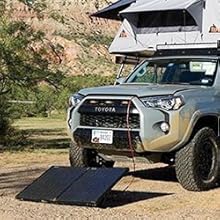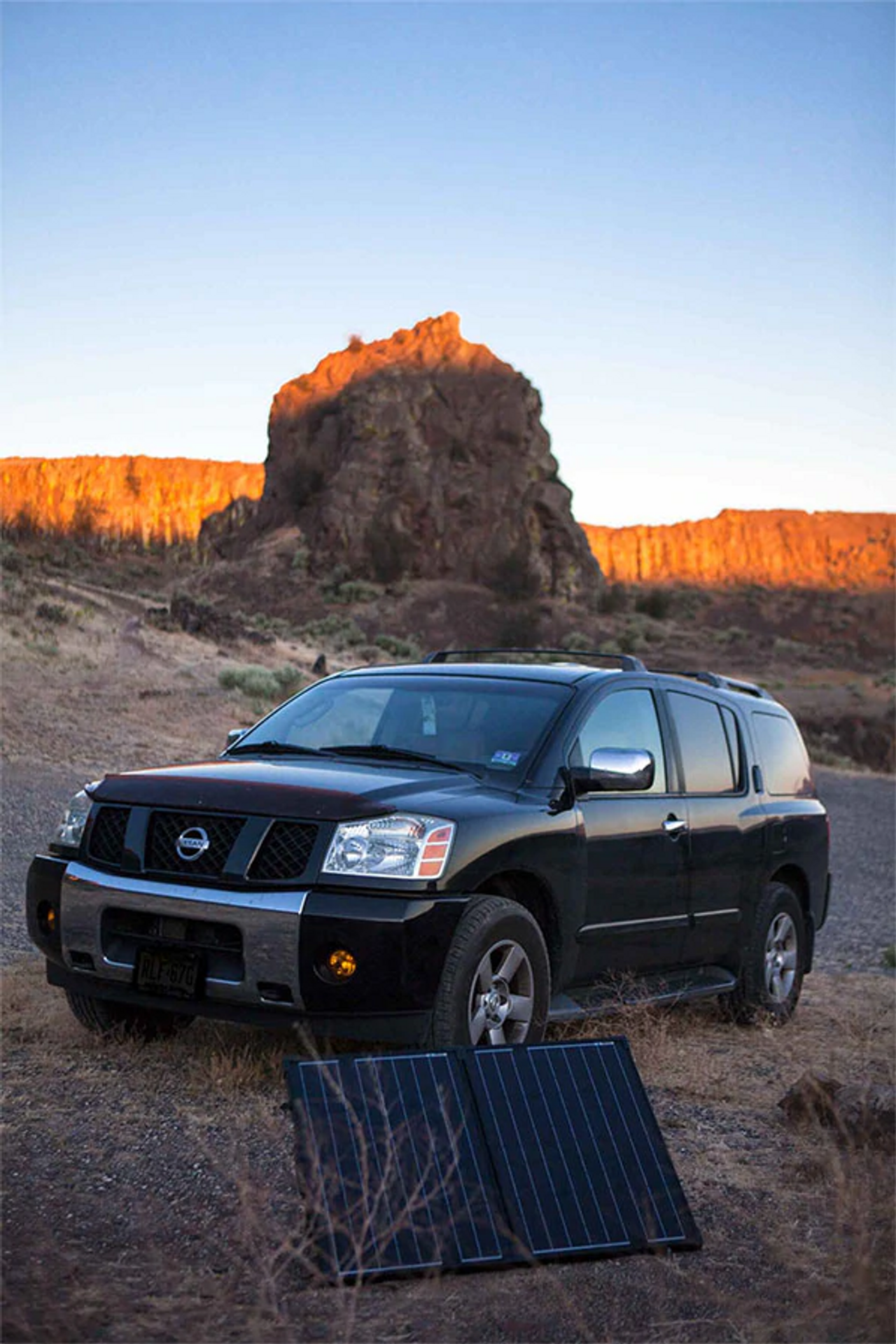Should I purchase portable solar panels?
Interested in dipping your toes in the world of solar without making the investment of a full rooftop installation? Portable solar panels are a great way to achieve this and are lightweight, easy-to-handle, and affordable.
What are Portable Solar Panel Systems?
Instead of mounting to the roof, portable solar panels are most often available in the form of folding suitcase panel kits that can be set up on the ground. Like roof-mounted panels, portable solar panels are made up of many solar cells made of silicon. Panels have both a positive and a negative layer, which creates an electric field. When sunlight hits solar panels, they create an electric current. Panels are connected to a charge controller, which controls how much current goes through a battery. Batteries store and produce DC power. In order to use household AC appliances, an inverter is used to change the power from DC into AC power.
Portable solar systems give you the ability to generate solar whether you’re at a cabin or in your RV, all with one system. With portable solar panels, you can be off-grid no matter where you find yourself. Using Renogy’s suitcase-style panels is as easy as folding the panels out on the ground and in the sun. They can also be placed at an angle for maximum solar production.
What are the benefits of portable solar panel systems
Portable solar panels are lightweight, easy-to-handle, and affordable. If you can’t justify installing roof mounted solar panels, portable solar power systems are a great option. They make a great addition to van, cabin, and RV living.



Solar panels can be moved between your vehicles and home.
A benefit of their portability is you can use the panels for multiple rigs, from your car or van to an RV. They also make a great addition to a disaster preparedness kit.
You have more freedom in where you park your vehicle.
With roof mounted panels, you’re often limited to which direction you park because you have to make sure the panels on your roof get maximum exposure to sunlight. With portable panels, you can place them wherever you need to to ensure maximum efficiency.
You don’t have to commit to mounting a panel to a roof.
If you’re new to solar and want to test it out before going through the full process of installing panels on the roof of your van or RV, portable solar panels are a great way to start harnessing the power of the sun.
Cons of Portable Solar Panel Systems



You have to set the panels up every time you want to use them.
Using portable solar panels isn’t as easy as just flipping a switch. Because your panels aren’t mounted on your roof, you’ll have to set them up and out in the sun whenever you’d like to start charging your batteries.
You can’t charge your batteries while you’re not present without a risk of theft or damage.
One major benefit of rooftop panels is being able to charge panels while you’re away from your vehicle. However, if you’re concerned about theft or damage to the panels from weather or other outdoor elements, portable solar panels may not be the best option for you. We’d recommend rooftop solar panels in your case.
Should I purchase portable or roof mounted panels?
Having roof-mounted panels reduces the risk of theft when you are away from your solar system. They also allow for quick and easy battery recharging without the fuss of setting up your solar panels every time.
If you’re going to be using your solar installation a majority of the time, have higher energy needs, and want to take advantage of being able to charge at any time, roof-mounted panels are the way to go. On the other hand, if you want a way to quickly and easily go solar without worrying about drilling holes in a roof and don’t mind setting up your panels when you want to use them, portable is most likely the best option for you.
What’s the difference between monocrystalline and polycrystalline?
Solar panels are typically available in polycrystalline or monocrystalline options. Polycrystalline panels, which are light blue in color, are less efficient, but they are also cheaper than monocrystalline. The process used to make polycrystalline silicon is simpler and therefore costs less to produce. Monocrystalline solar panels, which are dark blue in color, have the highest efficiency rates and are more space-efficient than polycrystalline panels. However, they are also more expensive.
You’ll notice that all of Renogy’s folding suitcase panels are monocrystalline panels. This is because we want to ensure you get the most energy production in the smallest package possible.
What does a portable solar system cost?
There are a variety of factors at play when it comes to system size and cost; however, generally speaking, a portable solar system can range from around £400 for the simplest, smallest set-up to upwards of £3,000 for larger installations with higher-quality batteries. Adding additional panels and batteries will also increase that cost as well.
What if I just want to charge my phone or tablet?
You typically don’t need large solar panels if all you want to do is keep your phone juiced up. Renogy has a range of power banks that make charging devices with the power of the sun easy and convenient. These devices are equipped with a USB port, allowing you to just plug-and-charge.
Conclusion
You know by now that adding solar to an RV or van can greatly improve your quality of life on the road by allowing you to run appliances without needing to hook up to shore power or generators. Using portable solar panels instead of mounting them to the roof makes the dream of producing clean, silent, and affordable energy even easier to attain.







